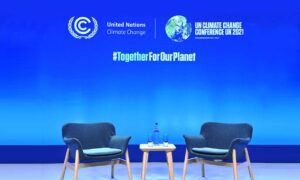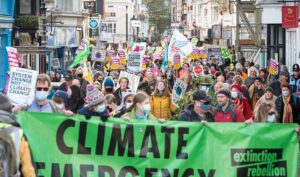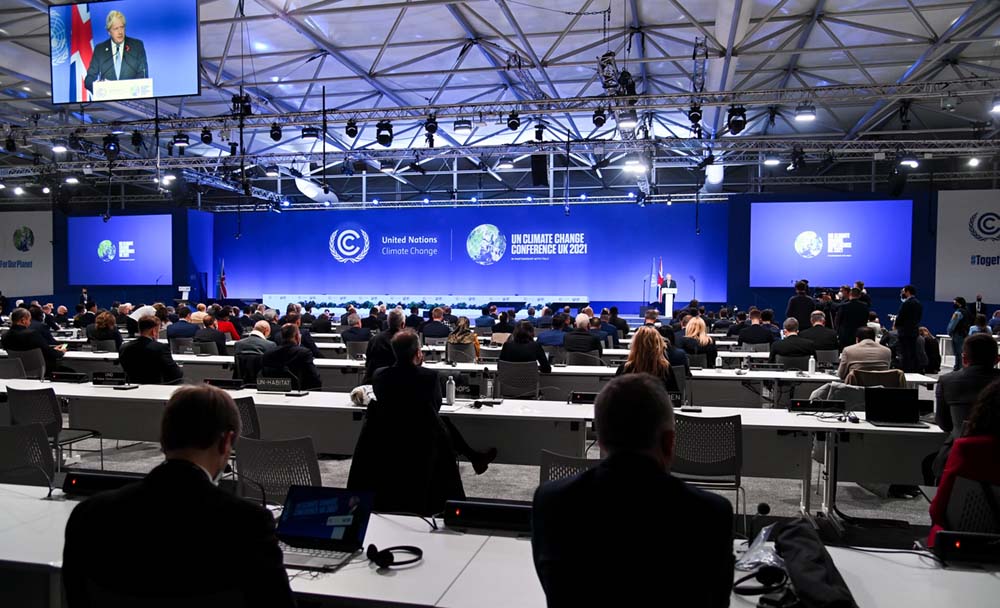The United Nations’ COP26 climate conference in Glasgow that is ending today has drawn sharp criticism from civil society groups and climate activists who felt that they were marginalized and had no meaningful access to the actual negotiations. As the conference comes to a close, it was announced that over 40 world leaders have backed a so-called “Breakthrough Agenda”. By contrast, climate activist Greta Thunberg on Twitter called COP26 a “greenwash festival”. It seems to be clear that the UK Government’s promise of hosting “the most inclusive COP ever” has sadly not been fulfilled.
Democracy Without Borders, a civil society group that is promoting a more democratic and accessible UN, commented that the intergovernmental COP process by definition was exclusionary and needed “a radical review”.
The climate crisis as a governance crisis
According to John Vlasto, an associate of Democracy Without Borders (DWB) and newly elected chair of the Executive Committee of the World Federalist Movement who was present in Glasgow “the whole COP circus is just another symptom of dysfunctional global governance. Had a world parliament deliberated and legislated for the common good of humanity 30 years ago, we would not be facing an environmental crisis today. The climate crisis is a governance crisis.”

“As a first step, a UN Parliamentary Assembly should be created and included in the climate negotiations,” added Andreas Bummel, DWB’s executive director.
In a last-minute effort, civil society organizations appealed to UN member state delegations to consider over fifteen recommendations “to enhance the participation of Indigenous Peoples organizations and civil society at COP26.” While thousands of civil society representatives were present in Glasgow and admitted as observers, only a handful had access to the actual negotiations and opportunities to engage.
“Civil society voices are critical to the outcome of COP, but we’ve not been able to do our jobs. If participation and inclusion are the measure of legitimacy, then we’re on very shaky grounds,” said Tasneem Essop, the executive director of Climate Action Network (CAN), which represents more than 1,500 organisations in over 130 countries, according to The Guardian.
Underrepresented peoples groups largely ignored
This sentiment was echoed by groups representing indigenous people, especially from the Global South. Even when they jumped through all the hoops and managed to get to Glasgow, CNN reported that they found a conference that “doesn’t reflect the real world and doesn’t feel inclusive”. Many others lucky enough to participate in the virtual sessions described them as “limiting” as observers could watch but say nothing.

Ruth Lchavaya K’isen Miller from the National Movement delegation even went further to describe the barriers to inclusion present as “working on a colonial framework to solve a problem caused by colonization”.
In order to provide citizens’ input to COP, a group of civil society organizations organized the first-ever “Global Citizens’ Assembly” on the sidelines of the climate conference and received praise from the UN Secretary-General and others. While this exercise has given a voice to ordinary people, it seems doubtful that it had an impact on the negotiations.
But COP26 has been a radically different experience for another group of people.
Fossil fuel industry representatives in front seats
While civil society groups struggled to have a meaningful impact, the conference centre was inundated by hundreds of representatives linked to the fossil fuel industry. More than 500 lobbyists from over 100 fossil fuel companies spent the full two weeks attempting to influence decision-making at the highest level according to Global Witness who analysed a list of attendees at COP. According to their investigation, 27 official country delegations even included fossil fuel lobbyists. Murray Worthy from Global Witness believes “their influence is one of the biggest reasons why 25 years of UN climate talks have not led to real cuts in global emissions”.
This preferential policy of access and limitations posed on civil society is worryingly similar to an ongoing ban on NGO representatives from entering the UN Secretariat building in New York on grounds of “Covid-19 safety”. However, the premises since September have been reopened to staff and other stakeholders. “There is a growing suspicion that concerns related to Covid-19 safety are used as a pretext for restricting civic space”, DWB’s Andreas Bummel, told IPS.
On November 8, the UN announced that due to public health restrictions to deal with the pandemic, civil society representatives will not be permitted to participate in-person in the highly important UN conference in New York that will review the Nuclear Non-proliferation Treaty in January 2022. According to the UN, access will be limited “to delegations and staff”.
Together with a broad coalition of civil society groups, DWB has been campaigning for a UN Parliamentary Assembly and additional proposals such as a UN World Citizens’ Initiative and a UN Civil Society Envoy. The international civil society statement for inclusive global governance has also been endorsed by environmental groups such as Greenpeace and The Nature Conservancy.
Update (18 Nov. 2021): On 17 November 2021, the President of the UN General Assembly at a “town hall” meeting with civil society representatives announced that with effect from 3 January 2022, CSO ground passes for entering the UN building will be renewed.




